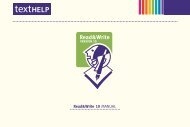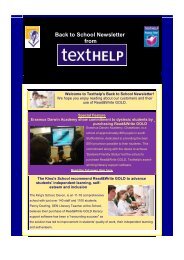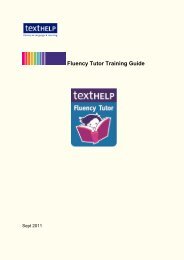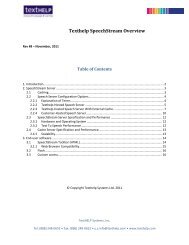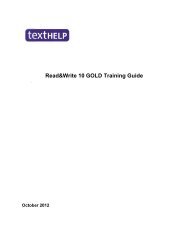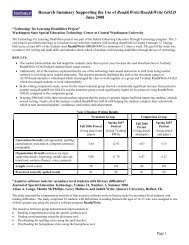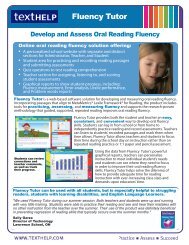01 NRDC Dyslexia 1-88 update - Texthelp
01 NRDC Dyslexia 1-88 update - Texthelp
01 NRDC Dyslexia 1-88 update - Texthelp
You also want an ePaper? Increase the reach of your titles
YUMPU automatically turns print PDFs into web optimized ePapers that Google loves.
Developmental dyslexia in adults: a research review 95<br />
Catts, H. W., Gillispie, M., Leonard, L. B., Kail, R. V. and Miller, C. A. (2002). ‘The role of speed<br />
of processing, rapid naming, and phonological awareness in reading achievement.’ Journal of<br />
Learning Disabilities, 35(6), 509–524.<br />
Ceci, S. J. (1991). ‘How much does schooling influence general intelligence and its cognitive<br />
components? A reassessment of the evidence.’ Developmental Psychology, 27(5), 703–722.<br />
Cestnick, L. and Coltheart, M. (1999). ‘The relationship between language-processing and<br />
visual-processing deficits in developmental dyslexia.’ Cognition, 71(3), 231–255.<br />
Chall, J. S. (1967). Learning to Read: The Great Debate. New York, NY: McGraw-Hill.<br />
Chall, J. S., Jacobs, V. A. and Baldwin, L. E. (1990). The Reading Crisis: why poor children fall<br />
behind. Cambridge, MA: Harvard University Press.<br />
Chapman, J. W., Tunmer, W. E. and Prochnow, J. E. (20<strong>01</strong>). ‘Does success in the Reading<br />
Recovery program depend on developing proficiency in phonological-processing skills? A<br />
longitudinal study in a whole-language context.’ Scientific Studies of Reading, 5(2), 141–176.<br />
Cheung, H. (1999). ‘Improving phonological awareness and word reading in a later learned<br />
alphabetic script.’ Cognition, 70(1), 1–26.<br />
Cheung, H., Chen, H. C., Lai, C. Y., Wong, O. C. and Hills, M. (20<strong>01</strong>). ‘The development of<br />
phonological awareness: effects of spoken language experience and orthography.’ Cognition,<br />
81(3), 227–241.<br />
Chiappe, P., Chiappe, D. L. and Siegel, L. S. (20<strong>01</strong>). ‘Speech perception, lexicality, and reading<br />
skill.’ Journal of Experimental Child Psychology, 80(1), 58–74.<br />
Chiappe, P., Stringer, R., Siegel, L. S. and Stanovich, K. E. (2002). ‘Why the timing deficit<br />
hypothesis does not explain reading disability in adults.’ Reading and Writing, 15, 73–107.<br />
Chomsky, N. (1957). Syntactic Structures. The Hague: Mouton.<br />
Cicchetti, D. and Cannon, T. D. (1999). ‘Neurodevelopmental processes in the ontogenesis and<br />
epigenesis of psychopathology.’ Development and Psychopathology, 11, 375–393.<br />
Clay, M. M. (1987). ‘Learning to be learning disabled.’ New Zealand Journal of Educational<br />
Studies, 22, 155–173.<br />
Cloninger, C. R. (2000). ‘A practical way to diagnose personality disorder: a proposal.’ Journal<br />
of Personality Disorders, 14(2), 99–108.<br />
Cloninger, C. R., Svrakic, N. M. and Svrakic, D. M. (1997). ‘Role of personality selforganisation<br />
in development of mental order and disorder.’ Development and<br />
Psychopathology, 9(4), <strong>88</strong>1–906.<br />
Cole, P. and Sprenger-Charolles, L. (1999). ‘Syllabic processing in visual word identification by<br />
dyslexic children, late readers and normal readers at age 11.’ Revue de Neuropsychologie,<br />
9(4), 323–360.



